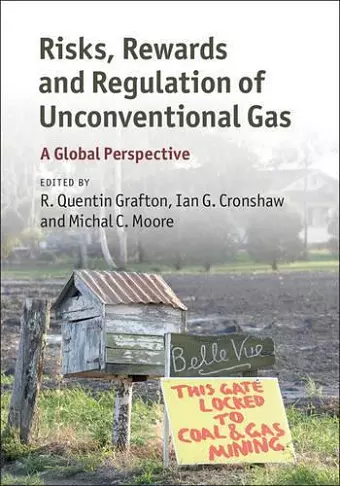Risks, Rewards and Regulation of Unconventional Gas
A Global Perspective
R Quentin Grafton editor Ian G Cronshaw editor Michal C Moore editor
Format:Hardback
Publisher:Cambridge University Press
Published:28th Dec '16
Currently unavailable, and unfortunately no date known when it will be back

This book explains the drivers and implications of unconventional gas at regional, national and global scales with case studies and in-depth analyses.
This book explains how the risks and rewards of unconventional gas weigh up at regional, national and global scales. Case studies and in-depth analyses of the development and regulation of unconventional gases in key countries offer a political, economic and governance-based perspective on the transition from carbon-intensive to renewable fuels.The global energy transition from carbon-intensive to renewable fuels has increasingly demanded a better understanding of the causes and consequences of the rapid development of unconventional oil and gas. Focusing on key countries including the United States, Canada, China, Argentina, the United Kingdom and Australia, this book consists of case studies and in-depth analyses that weigh up the risks and rewards at regional, national and global scales. Explaining how and why unconventional fuels are transforming the global energy landscape, the strengths, weaknesses, opportunities and threats are explored through a political, economic and governance-based perspective. Emphasis is placed on how to regulate the industry, encompassing local issues, stakeholder engagement and the social licence to operate. The new baseline studies and standards introduced in this book provide a timely insight into the trade-offs across the social, economic and environmental domains, making this ideal for researchers and policymakers in energy fields, and for graduate students.
'Risks, Rewards and Regulation of Unconventional Gas is a useful and thought-provoking book. It provides a foundation for further research and analysis. A complete reading brings to the surface two general issues that might otherwise lay hidden in the deeper strata of law and policy. First, what is the role of higher-order rules in the development of unconventional gas? … Second, the book also raises (by the vacuum of omission) the most interesting and important question in natural resources law today: to what degree are governments and institutions victims of 'regulatory capture'?' James Hickling, The Cambridge Law Journal
ISBN: 9781107120082
Dimensions: 254mm x 180mm x 26mm
Weight: 1170g
509 pages